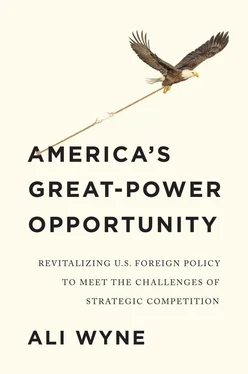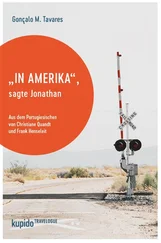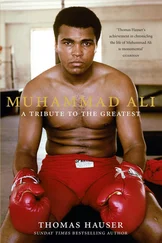While counterterrorism proved to be the Bush administration’s central focus, it did not ultimately gain enough traction to serve as an enduring basis for US foreign policy. The prospect of a terrorist organization’s acquiring a nuclear weapon was—and remains—sobering, but it did not represent the kind of existential threat to the United States that the Soviet Union did. Elite and public opinion increasingly questioned the strategic rationale for open-ended interventions in Afghanistan and Iraq, and the notion of a “global war on terrorism” lumped together the distinct threats posed by state actors such as Iran, Iraq, and North Korea and by non-state actors such as al-Qa’ida.
America’s emphasis on counterterrorism also seemed increasingly disconnected from the challenges of accelerating globalization and thickening interdependence. In his 2006 book The Audacity of Hope , Senator Barack Obama observed that, in the past, “America’s greatest threats came from expansionist states like Nazi Germany or Soviet Russia, which could deploy large armies and powerful arsenals to invade key territories, restrict our access to critical resources, and dictate the terms of world trade.” But he argued that the landscape was now different; citing terrorism, pandemic disease, and climate change, he concluded that “the fastest-growing threats are transnational.” 28Richard Haass offered a comparable assessment in mid-2008, noting that the primacy of those threats marked
a fundamental change from much of modern history, which … was shaped by great-power competition and often great-power conflict. This is now a different world … because the fact that great-power competition and conflict is no longer the driving force of international relations means that the world has opened up the possibility of meaningful cooperation between … the major powers of this era, including the United States and China. 29
Shortly before the 2008 presidential election, Robert Kagan concluded that “very few nations other than the United States consider terrorism to be their primary challenge.” Indeed, he continued, to most of the United States’ allies and partners, “it has been at best an unwelcome distraction from the issues they care about more.” 30If counterterrorism was too narrow a basis for US foreign policy, no self-evident successor appeared to be in the offing—though a brief episode in the fall would hint at one that would emerge as a linchpin of US foreign policy a decade later.
Russia and Georgia went to war in August 2008: it was the culmination of tensions that had emerged in the waning days of the Cold War and escalated sharply in 2003, with the Rose Revolution in Tbilisi that brought to power a pro-western president, Mikheil Saakashvili. The fight itself lasted only five days, concluding on August 12, 2008. President Saakashvili signed a French-brokered ceasefire agreement on August 15, and Dmitry Medvedev, the Russian president, followed suit the next day, marking the official end of the conflict. Ten days later, though, President Medvedev signed an order that declared the Georgian territories of Abkhazia and South Ossetia to be independent. Mercifully the conflict did not result in a third world war, despite some anxious speculations at the time. Still, Michael Kofman assesses that it “presaged the return of great-power politics and the end of the post-Cold War period. In 2008, Moscow demonstrated the will and ability to … challenge Washington’s design for a normative international order where small states can determine their own affairs independent [ sic ] of the interests of great powers.” 31
Despite its symbolic significance, the war was overshadowed by the summer Olympics, which took place in Beijing from August 8 through 24. It was a spectacle that spotlighted China’s growing stature. And the war faded further into the recesses of global consciousness with the collapse of Lehman Brothers on September 15, which precipitated the world’s severest macroeconomic crisis since the Great Depression. Given how sharply relations between the United States and China have deteriorated in the intervening years, it is hard to believe that these two countries coordinated as vigorously as they did in late 2008 and early 2009, spurring the G20 into action and helping to arrest a fastmoving recession. Their cooperation offered preliminary evidence that strategic distrust between the world’s lone superpower and a rapidly emerging power need not preclude partnership during global crises or marginalize existing international institutions. Reflecting on that result, Daniel Drezner notes that, “[d]espite initial shocks that were more severe than those of the 1929 financial crisis, global economic governance responded in a nimble and robust fashion in 2008.” 32
The Obama administration’s initial experience of dealing with China imbued it, understandably, with confidence about the potential for US–China cooperation. For some time Washington and Beijing even expressed a shared interest in developing a “new model” of great-power relations—a nebulous but attractive call to elevate cooperative imperatives over structural tensions. 33The logic was compelling: the world would be unable to address pressing challenges without robust collaboration between its only superpower, which possessed the largest economy, and its principal driver of growth, which commanded the second-largest. Even so, the construct did not gain enduring support; the United States was reluctant to suggest that it regarded China as a peer, and China, though agitating for greater sway in prominent international fora, did not want to imply that it bore as much responsibility for maintaining the postwar order as the United States did. Still, the two countries undertook several joint efforts, launching the US–China Clean Energy Research Center in November 2009, signing a landmark climate change agreement in November 2014, and inking a deal to promote greater trust in cyberspace in September 2015. So, even as strategic frictions between them intensified, the two countries seemed able—and, as importantly, willing—to prevent competitive dynamics from crowding out the cooperative ones.
The Obama administration notched a number of cooperative successes with Russia as well. Washington and Moscow partnered to shore up the Northern Distribution Network, which played a key role in routing supplies to US troops when they were deployed in Afghanistan. On February 5, 2011, the two countries signed New START, a major nonproliferation agreement that was effective for ten years and restricted each signatory to 1,550 deployed strategic warheads. Russia joined the World Trade Organization (WTO) at the end of the year, becoming the last G20 member to do so. In late 2013 and early 2014, Washington and Moscow worked together to secure and transport out of Syria 1,300 tons of its chemical weapons. Finally, they collaborated on the negotiations that would ultimately result in a breakthrough deal to constrain Iran’s atomic activities: the Joint Comprehensive Plan of Action (JCPOA).
Aggression in Europe and Tension in Asia
Despite these glimmers of hope, US observers began to express growing concerns over renewed strategic competition during the second term of the Obama administration. Russia’s annexation of Crimea proved to be a pivotal inflection point: the Congressional Research Service characterizes it as “[t]he sharpest single marker of the shift in the international security environment to a situation of renewed great-power competition.” 34In March 2014, in a referendum that the Obama administration pronounced illegitimate, Crimea voted to secede from Ukraine. Five days afterward the secretary general of the North Atlantic Treaty Organization (NATO) declared that “Russia’s military aggression in Ukraine is the most serious crisis in Europe since the fall of the Berlin Wall.” He went on: “We had hoped this kind of revisionist behavior was confined to the nineteenth century. But we see it is back in the twenty-first century.” 35His language spoke to a deepening anxiety among western—and especially US—observers that the post-Cold War configuration was more tenuous than it had seemed in the 1990s. Shortly after Moscow’s wresting of Crimea, Walter Russell Mead warned that Russia, China, and Iran were all contesting that arrangement. Although downplaying the suggestion that the three countries formed an alliance or would eventually emerge into one (he cited critical differences between their material capacities and their strategic objectives), Mead stressed their shared belief that “US power is the chief obstacle to achieving their revisionist goals.” 36
Читать дальше












